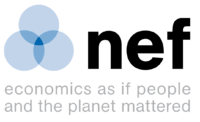New Economics Foundation
 | |
| Abbreviation | NEF |
|---|---|
| Motto | Economics as if people and the planet mattered. |
| Formation | 1986 |
| Type | ecological economics public policy think tank |
| Headquarters | 3 Jonathan Street, London, United Kingdom |
Executive Director Director of Operations |
Stewart Wallis Elna Kotze |
| Website | www.neweconomics.org |
The New Economics Foundation (NEF) is a British think-tank that promotes social, economic and environmental justice.[1]
NEF was founded in 1986 by the leaders of The Other Economic Summit (TOES) with the aim of working for a "new model of wealth creation, based on equality, diversity and economic stability".[2]
The foundation has 50 staff in London and is active at a range of different levels. Its programmes include work on well-being, its own kinds of measurement and evaluation, sustainable local regeneration, its own forms of finance and business models, sustainable public services, and the economics of climate change.
Work
NEF works in the areas of community development, democracy, and economics. The foundation's work on sustainability indicators, which measures aspects of life and environment, indicated the connection between economic growth and sustainability.[3]
From 1995 to 2000 NEF made social audits of companies to measure and evaluate a company's social and ethical performance according to its standards. This work was instrumental in the formation of the Institute of Social and Ethical Accountability to promote professional standards around social accounting and auditing.[4]
Jubilee 2000 campaign
The Jubilee 2000 campaign, strategised for and run by NEF,[5] collected 24 million signatures for its worldwide petition on development and poverty.[6]
Local Money Flows
NEF has also developed a Local money Flows measurement program and enables the mapping of money flows through the local economy.[7]
Happy Planet Index
In July 2006, NEF launched the Happy Planet Index, intended to challenge existing indices of a state's success, such as Gross Domestic Product (GDP) and Human Development Index (HDI).
21-hour working week
In February 2010 the New Economic Foundation called for gradual transition to a working week of 21 hours.[8]
History
James Robertson, a British economist, and Alison Pritchard, a Schumacher Society Council member, helped to set up The Other Economic Summit (TOES) and NEF.[9] Ed Mayo was Chief Executive from 1992 until 2003.[10] The current executive director is Stewart Wallis.
At the policy level, NEF has attracted Gordon Brown (when he was Chancellor of the Exchequer) to chair some of its events. The organisation has launched a range of new organisations to promote its ideas, including the Ethical Trading Initiative, AccountAbility, Time Banking UK, London Rebuilding Society, the Community Development Finance Association, and others.
The organisation's current projects include measuring local money flows, developing new kinds of business enterprise, and introducing techniques of sustainable regeneration (Local Alchemy). NEF's BizFizz program, an entrepreneurship development program has created more than 900 new businesses in deprived areas. The organisation has now taken this and Local Alchemy to six other countries through its international programme.
At a cultural level, NEF events at the Hay literary festival attract well-known speakers. Its Clone Town campaign in favour of local economic diversity was covered two years running by every major national newspaper and TV news station and it was taken up in the Save Our Small Shops Campaign in the Evening Standard.
The organisation was voted Think-Tank of the Year in 2002/3. In 2010 NEF announced a long-term alliance with the New Economics Institute in the USA.
Funding
NEF is a registered charity and is funded by individual supporters, public finance businesses and international grant-giving bodies.[11]
Publications
Publications include:
- Public services and (in)equality in an age of austerity by Joe Penny (July 2013)
- Where does money come from? by Andrew Jackson,Richard Werner,Tony Greenham,Josh Ryan-Collins (12 December 2012)
- Growth isn't Possible: Why rich countries need a new economic direction by Andrew Simms, Dr Victoria Johnson, Peter Chowla (25 January 2010).
- 21 hours: Why a shorter working week can help us all to flourish in the 21st century by Anna Coote, Andrew Simms and Jane Franklin (13 February 2010).
- The Great Transition, Josh Ryan-Collins (18 October 2009) webpage
- The Consumption Explosion by Andrew Simms,Victoria Johnson,Joe Smith,Susanna Mitchell (24 September 2009) webpage
- The Happy Planet Index: An index of human well-being and environmental impact by Nic Marks, Saamah Abdallah, Andrew Simms and Sam Thompson, (12 July 2006).
- Clone Town Britain: The survey results on the bland state of the nation Andrew Simms, Petra Kjell and Ruth Potts (6 June 2005).
See also
- Coproduction of public services by service users and communities
- E. F. Schumacher
- Great Transition
- List of UK think tanks
- Open Source Ecology
- New Economy Coalition - sister organisation in America
- New Economy movement
- Schumacher Circle organisations
- Transition town
References
- ↑ new economics foundation website, What We Do.
- ↑ The Other Economic Summit and the New Economics Foundation
- ↑ The other economic summit and the New Economics Foundation
- ↑ The other economic summit and the New Economics Foundation
- ↑ Greenhill, Romilly (February 2002). The unbreakable link - debt relief and the millennium development goals. New Economics Foundation and Jubilee Debt Campaign.
- ↑ Jubilee research. New Economics Foundation.
- ↑ The other economic summit and the New Economics Foundation
- ↑ "21 hours". New Economics Foundation. 2010-02-13. Retrieved 2013-08-11.
- ↑ Schumacher Society, Schumacher Briefing: Transforming Economic Life - A Millennial Change
- ↑ The Guardian, 14 July 2009, Ed Mayo resigns from Consumer Focus
- ↑ Schumacher Briefing
External links
- Official website
- "New Economics Foundation" at The Philanthropy Atlas by The Institute for Philanthropy
"New Index (Inner City 100) will Reward Inner City Innovations", University of Sheffield
|